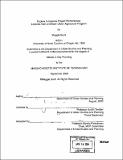| dc.contributor.advisor | Judith Tendler. | en_US |
| dc.contributor.author | Scott, Maggie, 1975- | en_US |
| dc.contributor.other | Massachusetts Institute of Technology. Dept. of Urban Studies and Planning. | en_US |
| dc.coverage.spatial | s-cl--- | en_US |
| dc.date.accessioned | 2006-03-24T18:12:39Z | |
| dc.date.available | 2006-03-24T18:12:39Z | |
| dc.date.issued | 2003 | en_US |
| dc.identifier.uri | http://hdl.handle.net/1721.1/30022 | |
| dc.description | Thesis (M.C.P.)--Massachusetts Institute of Technology, Dept. of Urban Studies and Planning, 2003. | en_US |
| dc.description | "September 2003." | en_US |
| dc.description | Includes bibliographical references. | en_US |
| dc.description.abstract | This thesis investigates a Chilean urban agriculture project that has been underway for more than twenty years in Tome, a small coastal town located near the regional capital of Concepcion. Initiated in the early 1980s by the Chilean non-governmental organization, CET SUR, the program works on themes of food security and poverty alleviation, environmental issues and women's leadership development. In 1999, this project began to replicate the Tome experience to seven additional towns in and around the Greater Concepcion area with a new initiative entitled the Toward Sustainable Cities Project. Similar urban agriculture programs began at the same time in Santiago, but only remnants of those projects remain: a program for seniors here, a demonstration garden at the environment center there. The project in Tome, instead of shrinking as economic conditions improved from the crisis of the early 1980s, has recently spread to seven additional towns. This puzzle forms the crux of my research: what are some of the factors that may explain why this project has achieved this longevity and managed to grow its program, while similar programs in Chile have long since vanished? The investigation identifies two sets of factors that distinguish the Toward Sustainable Cities Project from other urban agriculture programs. The first is the high level of dedication to the job of its frontline workers. CET SUR motivates these workers in several ways: offering them opportunities to develop their personal skills, as well as granting them substantial discretion in decisionmaking. The second factor that contributes to the project's relative success is the myriad networks CET SUR has developed with government. CET SUR has developed these networks by linking program objectives with political realities such as the need of local elected officials to deliver concrete and/or visible benefits to constituents and maintain a high public profile. | en_US |
| dc.description.statementofresponsibility | by Maggie Scott. | en_US |
| dc.format.extent | 91 leaves | en_US |
| dc.format.extent | 4249567 bytes | |
| dc.format.extent | 4249375 bytes | |
| dc.format.mimetype | application/pdf | |
| dc.format.mimetype | application/pdf | |
| dc.language.iso | eng | en_US |
| dc.publisher | Massachusetts Institute of Technology | en_US |
| dc.rights | M.I.T. theses are protected by copyright. They may be viewed from this source for any purpose, but reproduction or distribution in any format is prohibited without written permission. See provided URL for inquiries about permission. | en_US |
| dc.rights.uri | http://dspace.mit.edu/handle/1721.1/7582 | |
| dc.subject | Urban Studies and Planning. | en_US |
| dc.title | Factors to improve project performance : lessons from a Chilean urban agriculture program | en_US |
| dc.type | Thesis | en_US |
| dc.description.degree | M.C.P. | en_US |
| dc.contributor.department | Massachusetts Institute of Technology. Department of Urban Studies and Planning | |
| dc.identifier.oclc | 55065110 | en_US |
